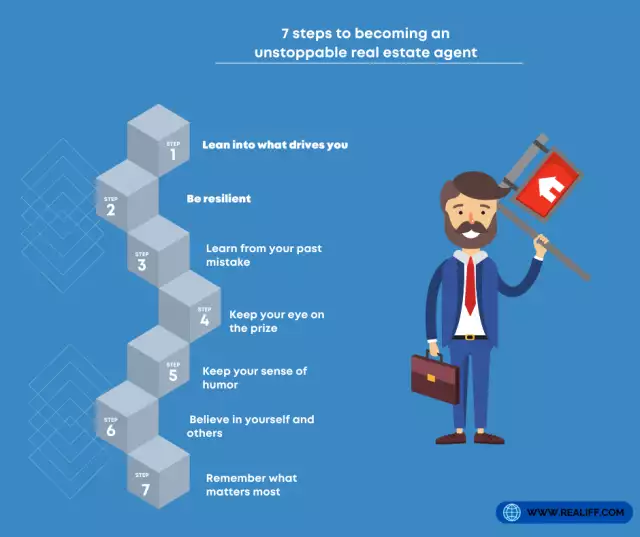Becoming a Real Estate Agent: Comprehensive Guide and Tips
Becoming a Real Estate Agent: Comprehensive Guide and Tips
Deciding to become a real estate agent is a significant career change. Individuals from various backgrounds and stages of life are drawn to the real estate industry. While everyone has unique motivations for pursuing this path, one common question emerges: "How do I become a real estate agent?" This comprehensive guide will walk you through the essential steps, requirements, and benefits of becoming a licensed real estate agent.
General Requirements to Become a Real Estate Agent
To become a licensed real estate agent, you must meet specific requirements:
- Be at least 18 or 19 years old, depending on the state.
- Have legal residency in the United States.
- Complete the required pre-license education.
- Pass the state real estate license examination.
These requirements form the foundation for becoming a licensed real estate agent. However, the specifics can vary depending on the state you reside in.
Steps to Become a Real Estate Agent
While the details may differ by state, there are five general steps that every individual must take to earn their license and become a real estate agent.
Step 1: Understand Your State’s Real Estate Licensing Requirements
Each state has different licensing requirements, which you can find on your state’s Real Estate Commission website. It’s essential to understand these requirements to ensure you meet all the criteria before starting your journey. Researching your state’s specific requirements will give you a clear roadmap to follow.
Step 2: Enroll in a Real Estate Pre-Licensing Course
Various options are available to complete your real estate pre-licensing education, including live classrooms, online courses, and home-study programs. Choose the method that best fits your learning style and schedule. Ensure that the school you select has a good reputation and offers quality content.
Step 3: Apply to Take the Real Estate Salesperson Exam
Timing is crucial at this stage. Follow your state’s application process closely to sit for your real estate exam soon after completing your courses. This process may include submitting fingerprints and passing a background check, which can take several weeks to process. Ensuring all paperwork is correctly filed will help avoid delays.
Step 4: Pass the Real Estate Salesperson Exam
Passing the exam requires more than completing educational requirements; it also involves thorough preparation. Enroll in a real estate exam prep class, take practice exams, and work through comprehensive topical reviews to sharpen your knowledge and prepare for exam day. Consistent study and practice are key to success.
Step 5: Find a Real Estate Broker
Once you pass your exam and complete the final paperwork with the state, you will receive your license. Finding a real estate broker early in your licensing process is beneficial as they can guide you and help you gain experience. A broker will provide mentorship and resources crucial for your career development.
Why Become a Real Estate Agent?
Diverse Daily Activities
As a real estate agent, no two days are the same. You will interact with various clients, view numerous properties, and handle different transactions. This variety makes the career both stimulating and rewarding. The dynamic nature of the job ensures that you are always learning and adapting.

Be Your Own Boss
One of the most appealing aspects of being a real estate agent is the ability to be your own boss. You can set your schedule, choose your clients, and direct your professional growth, allowing for a work-life balance that suits your goals. This autonomy enables you to tailor your career to fit your personal life and aspirations.
Financial Rewards
Entering the real estate industry offers significant earning potential without requiring a college degree. Your income is directly tied to your effort and success, making real estate an attractive option for many. Commissions based on sales mean that hard work and dedication can lead to substantial financial rewards.
Salary Information for Real Estate Agents
The salary of a real estate agent depends on the number of properties sold and the commission percentage for those sales. According to the U.S. Department of Labor, the mean salary of a real estate agent is around $65,850. However, top performers can earn significantly more, making real estate a lucrative career choice.
Career Options for Real Estate Agents
A real estate license opens the door to various opportunities within the housing industry, such as:
- Real Estate Broker:Manages a team of real estate agents.
- Appraiser:Verifies the value of real estate properties.
- Property Manager:Oversees and maintains real estate properties.
- Real Estate Investor:Buys and sells properties for financial gain.
- Real Estate Attorney:Provides or examines closing documents.
- Home Inspector:Inspects the condition of properties before purchase.
- Mortgage Loan Officer:Works with financial institutions to originate property loans.
- Real Estate Photographer:Captures images of properties.
- House Stager:Ensures properties look their best for potential buyers.
These career paths highlight the versatility of a real estate license and the diverse opportunities available in the industry.
How Long Does it Take to Become a Real Estate Agent?
On average, it takes four to six months to complete the required courses and pass the licensing exam. Factors influencing this timeline include whether you take courses online or in a classroom, the state where you obtain your license, and the number of attempts needed to pass the exam. Commitment and diligent study can expedite the process.
Real Estate Agent Reciprocity
Real estate is typically a state-specific profession, but some states allow license reciprocity, enabling agents from certain states to apply for a license in a different state without retaking all required pre-licensing courses. This flexibility can enhance career mobility and open up more opportunities.
Is Becoming a Real Estate Agent Right for You?
Consider using a pros and cons list to determine if a real estate career is right for you. The flexibility of the job is appealing, but it also comes with demands such as handling paperwork, prospecting leads, developing relationships, and managing clients. Reach out to local agents and brokers to ask about their day-to-day work and long-term career prospects.
Promoting Yourself as a New Real Estate Agent
Building a network and marketing yourself effectively are crucial for launching your real estate career. Here are some strategies to get started:
- Leverage Your Existing Network:Inform friends and family about your new career for referrals and support.
- Engage with Local Professionals:Connect with builders, other agents, and lenders to create business opportunities.
- Use Social Media:Create a professional online presence on platforms like Facebook, Instagram, and LinkedIn to market your services.
The Realities of Being a Real Estate Agent
While real estate can be lucrative, it requires understanding the industry's realities. You must obtain a license, which involves completing pre-licensing coursework, passing a background check, and taking the licensing exam. Financial preparation is crucial as the income from real estate transactions can be irregular. Being prepared for these challenges is key to long-term success.
Building Relationships and a Sales Mindset
Networking with experienced peers and mentors is vital for success. Understanding the sales aspect of real estate is also essential, as your income depends on closing deals. Developing strong communication and negotiating skills will help you build trust with clients and succeed in the industry. Building relationships and a sales mindset is fundamental to a thriving real estate career.

Continuous Learning and Upskilling
To advance in your career, focus on continuous learning. Attend training programs, take niche courses, and participate in webinars to stay updated and improve your skills. The real estate industry is constantly evolving, and staying informed about new trends and regulations will keep you competitive.
News in Real Estate
The real estate market is dynamic, with new trends and developments shaping the industry. Recently, there has been a significant shift towards digital tools and online platforms, making it easier for agents to manage their transactions and connect with clients. Additionally, sustainability and eco-friendly properties are becoming increasingly popular, reflecting a growing demand for environmentally conscious real estate.
Expert Quote
"Real estate is not just about property; it's about people. A successful real estate agent understands the importance of building relationships and providing exceptional service." – Barbara Corcoran, Real Estate Mogul and Business Expert.
Conclusion
Becoming a real estate agent offers a rewarding career with flexibility, financial potential, and the chance to make a significant impact on clients' lives. Whether you're just starting or considering a career change, the real estate industry provides numerous opportunities for growth and success.
Realiff.com connects you with top real estate professionals and offers insights to help you secure the best deals and even get up to 2% cash back on your property purchase. Start your journey today and explore the dynamic world of real estate with Realiff.com by your side.
The Most Comprehensive Tips for All Aspects of Becoming a Real Estate Agent
- Evaluate Your Financial Situation:Ensure you have enough funds to invest and maintain an emergency reserve.
- Understand Market Conditions:Stay updated on market trends to make informed decisions.
- Hire a Real Estate Agent:Even experienced investors benefit from the insights and assistance of a knowledgeable agent.
- Get a Property Inspection:Always inspect the property to avoid unexpected repairs and ensure a sound investment.
- Consider Future Flexibility:Think about long-term plans and whether having significant capital tied up in a property aligns with them.
- Use Professional Services:Hire professionals for legal advice, appraisals, and other services to protect your investment.
Frequently Asked Questions About Becoming a Real Estate Agent
Q: Why should I become a real estate agent?
A:Becoming a real estate agent offers flexibility,
significant earning potential, and the opportunity to help clients
with important life decisions.
Q: When should I start the process of getting a real estate
license?
A:Start as soon as you've decided this career path
is right for you and you understand your state's requirements.
Q: Where can I take pre-licensing courses?
A:Pre-licensing courses are available online, in
classrooms, and through home-study programs offered by accredited
institutions.
Q: What are the costs involved in getting a real estate
license?
A:Costs can include pre-licensing courses
($200-$900), the licensing exam fee ($100-$300), and license
application fees ($200-$400).
Q: Who helps me with real estate transactions after I get
my license?
A:A licensed real estate broker will mentor and
guide you through transactions, ensuring you adhere to legal and
ethical standards.
Q: How can I improve my chances of passing the real estate
licensing exam?
A:Enroll in exam prep classes, take practice
exams, and thoroughly review all study materials to increase your
chances of success.
By following these steps and leveraging the right resources, you can embark on a successful career as a real estate agent.



